Have you ever found yourself asking, how much does a donkey actually weigh? The weight of a donkey, based on its size, can vary anywhere between 200 to 1,300 pounds. Commonly, there are 3 different-sized donkeys in the United States. Miniature donkeys typically weigh somewhere between 200 and 400 pounds. Standard donkeys weigh anywhere from 400 to 900 pounds. Mammoth donkeys, the largest in the U.S., typically weigh 900 to 1,300 pounds.
Why is it important to know how much a donkey weighs?
A donkey’s weight is significant to be aware of for many reasons. How much a donkey weighs can be one of the leading indicators of the animal’s overall health. Because of this, donkeys should be monitored quite regularly for any changes in their weight. A monthly check would be ideal.
Another reason people need to know about donkey weights is to help them determine which size donkeys to get based on their needs. If a person wants a donkey for riding purposes, they will likely want one of the largest-sized donkeys, a mammoth donkey. Whereas if they want a pet for their children, they’ll likely want a miniature donkey.
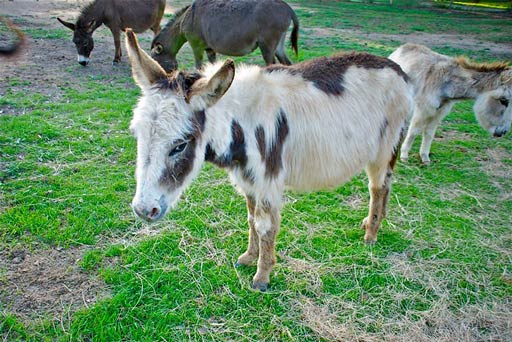
It is also essential to know the weight of a donkey to determine how much the animal can carry, whether it be a human rider or a pack. The general rule of thumb is that donkeys can carry 20-25% of their body weight. Owners will need to know how much a donkey weighs to determine how much that is.
Knowing how much a donkey weighs is also a requirement for determining how much feed to give them. For example, when considering forage, hay, and straw, an adult donkey should be expected to eat 1.5 % of its body weight daily. Without knowing the animal’s body weight, it would be challenging to figure out the correct amount of straw, hay, and grazing area to provide for the donkey.
How to determine how much a donkey weighs?
An industrial or large animal veterinarian scale is required to get an exact weight for a donkey. However, those can be hard to come by for most owners, or they require the donkey to be loaded into a trailer to travel to a large animal vet office. Traveling to the vet can be a pain for both owner and donkey. However, there is another way to estimate a donkey’s weight.
To estimate a donkey’s weight, you’ll have to do some measurements. You’ll want to measure the heart girth, the length of the body, and the height of the donkey at the withers. To get the heart girth measurement, take either your measuring tape or a string, and place it around the thoracic region. Place it behind the donkey’s elbows and over the spot where the withers meet the backbone. Using a string instead of a measuring tape can help if your measuring tape doesn’t bend well. All you need to do is measure the string after measuring the animal.
The subsequent and most straightforward measurement is to measure the length of the donkey’s body. Take your string or measuring tape, place it on the shoulder, and measure towards the buttocks.
The next step is to measure the height of your donkey. To get this measurement, measure from the bottom of the hooves to the top of the withers. That’s all there is to it.
You can take these measurements and plug them into an equine weight calculator or calculate the weight for yourself. To do so, take its height measurement and multiply it by the heart girth measurement. The resulting number then gets multiplied by the length of the donkey’s body. That number is then divided by 300 to get the resulting estimated weight.
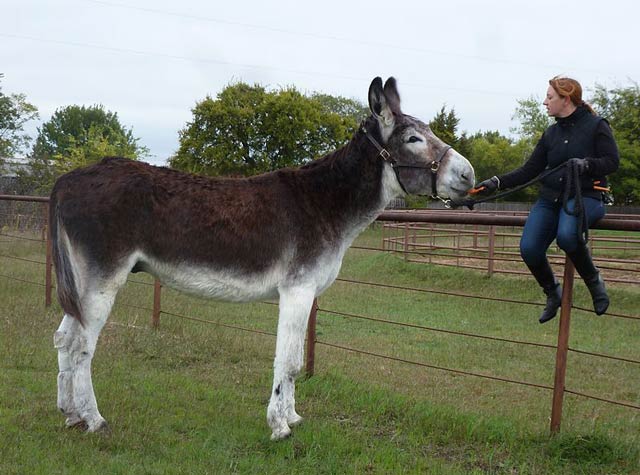
How much do baby donkeys weigh?
The weight of a newborn donkey depends on the size of the parents. For example, a miniature donkey will typically weigh between 18 and 25 pounds at birth. A standard donkey will usually weigh somewhere between 19 and 30 pounds at birth. Estimating what a mammoth donkey will weigh at birth can be a bit more difficult. Its weight will depend on the weight of its mother.
However, a fair estimate is that the foal, at birth, would weigh about 10% of the mother’s weight. For miniature and standard donkeys, it can take them between three and four years to fully mature into their adult weight. Mammoth donkeys can take even a bit longer to develop fully.
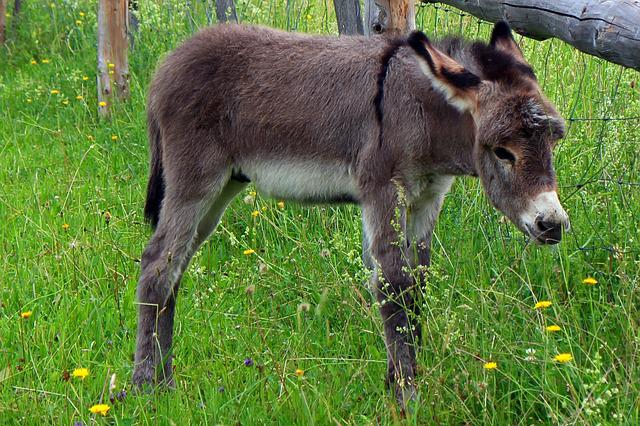
Underweight donkey
If you find that your donkey is becoming underweight, first take it to a vet to rule out any serious health problems. It is relatively easy to tell if a donkey is malnourished as you will be able to see the rib bones and hip bones quite clearly the more underweight they are. Frequent monitoring is vital to ensure that you catch these changes before they turn into serious health problems.
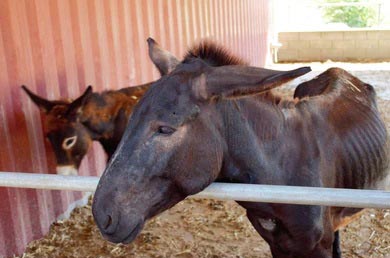
While you and your vet work on helping your donkey gain weight, providing adequate shelter is critical. Your donkey will need to remain warm to conserve more energy. Consider getting a donkey rug or blanket to keep your donkey extra warm. Also, remember that any changes to food or the amount of food given should happen gradually to avoid shocking the donkey’s system.
Feeding an underweight donkey
If your donkey doesn’t have any dental issues, try feeding straw, high-quality hay, or a high fiber haylage, another term for chopped forage. If its teeth are poor, try giving a low sugar and starch replacement product instead. For extremely underweight donkeys, try providing Alfalfa in small quantities as it has a higher protein level.
Overweight donkey
If not immediately apparent why your donkey is gaining weight, take your donkey to the vet to find the reason for the weight gain. Sometimes weight gain can happen because we give too many treats. But you’ll want to make sure that there isn’t a serious underlying health concern. Like underweight donkeys, only make gradual changes to an overweight donkey’s diet. Ensure that the donkey does not lose more than 10-11 pounds per month. Doing so could send their body into a state of shock, causing even more severe health problems.
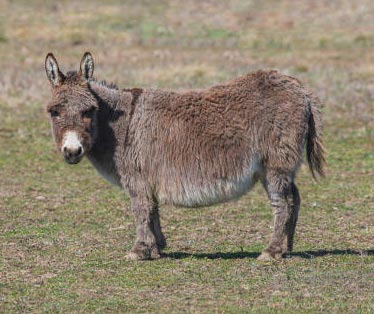
Overweight donkeys typically have overly thick necks, especially at their mane. You’ll also notice an extra layer of fat on their shoulders, backs, and hindquarters, resulting in them having difficulties walking. Remember that donkeys who have been obese for a long time may never lose the calcified fat pads on their necks.
Feeding an overweight donkey
Be sure never to starve or underfeed an overweight donkey, as this could lead to hyperlipidemia, resulting in abnormally high levels of triglycerides or fat in the bloodstream. Hyperlipidemia can result in serious health risks like organ failure. Instead, to promote weight loss, consider choosing a feed that is low in energy but high in fiber. Also, try feeding barley straw or wheat straw.
You can also try feeding the donkey small meals often instead of larger, more infrequent meals. Mimic the natural grazing tendencies that they would exhibit out in the wild. Also, be sure to limit cereal-based feed and sugary treats. For training, high fiber nuts can be a great substitution.
A common reason for donkeys gaining weight is overeating on rich grasses. While most people love to spoil their pets, it is best not to let them overindulge, whether they are pets or working animals. Consider moving your donkey to a bare paddock or a sand paddock to control their eating better.
Another tip would be to try spacing out the distance between feeders, water sources, and shelters to encourage the animal to move more throughout the day.
Monitoring your donkey’s weight
Knowing your donkey’s weight isn’t enough to ensure a lifelong healthy donkey. It is essential to continually monitor your donkey’s weight so that you may be made aware of any developing health concerns before they truly become an issue.
Many vets and donkey owners recommend keeping a written journal of your monthly, weekly, and even daily observations. Does the animal’s neck feel a little bit thicker today? Are his hip bones jutting out all of a sudden? Can you visibly see his ribs? Is his back end looking a little fuller than usual? These can all be weight loss and weight gain indicators and should get jotted down in your journal.
Over time, you can look back at your journal and see if you notice any patterns of what you were seeing. A journal is an excellent idea for monitoring the weight of your animal and any other health factors as well. Is the animal in good spirits? Are the animal’s feet in good condition? How about the donkey’s teeth?
Jotting down your observations once a week or even just once a month can significantly help. Not only to you, but this information can be vital to your veterinarian. If problems develop down the road, you and your vet can look back at your observations and see when the changes started occurring and if any other factors need consideration.
Condition scoring
Condition scores are to be based on the Donkey Body Condition Score Chart. This score chart is to be used with a visual and a hands-on assessment of the donkey.
There are five specific areas on a donkey’s body that owners should monitor. They include the neck and shoulders, the withers, the ribs and belly, the back and loins, and the hindquarters. The condition score is a 1-5 score. A score of one means the animal is in poor condition or very thin. A score of two puts the donkey in the moderate or underweight category. A score of three indicates the ideal state for a donkey. A score of 4 indicates an overweight or fat donkey. Finally, a score of 5 indicates an obese or a very fat donkey.
Most vets recommend that owners closely examine, both visually and hands-on, their donkey at least once a month and record what they find and their condition score in their weight monitoring journal. This simple process will help ensure that donkeys remain in peak physical health.
Conclusion
In conclusion, if you ever find yourself asking just how much a donkey weighs, you now have all the knowledge and tools at your disposal to find it out. Knowing how much donkeys weigh is a significant determining factor in their overall health and well-being. It is a key factor in determining how much food a donkey should have throughout a given day. It is also vital for owners to know how much their donkey weighs to plan appropriately regarding how much weight their donkey can carry in its saddle pack or how heavy of a rider a saddle donkey can handle.
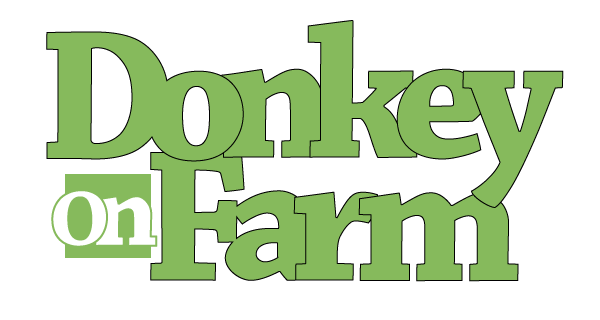
![How Much Does a Donkey Weigh? [Plus Weight Monitoring Tips] How-much-does-a-donkey-weigh](https://donkeyonfarm.com/wp-content/uploads/2022/04/How-much-does-a-donkey-weigh.jpg)

![How Cold is Too Cold for a Donkey? [Plus Tips to Keep Them Warm] How-Cold-is-Too-Cold-for-a-Donkey](https://donkeyonfarm.com/wp-content/uploads/2022/09/How-Cold-is-Too-Cold-for-a-Donkey-270x180.jpg)
![How to Get Rid of Flies on Your Donkey? [Plus Prevention Methods] How to Get Rid of Flies on your Donkey](https://donkeyonfarm.com/wp-content/uploads/2022/05/How-to-Get-Rid-of-Flies-on-your-Donkey-270x180.jpg)
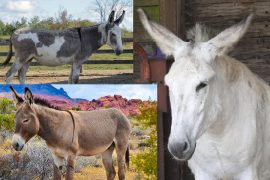
![Should Donkeys Be Stabled at Night? [With Alternatives to a Stable] Should-donkeys-be-stabled-at-night](https://donkeyonfarm.com/wp-content/uploads/2023/04/Should-donkeys-be-stabled-at-night-270x180.jpg)